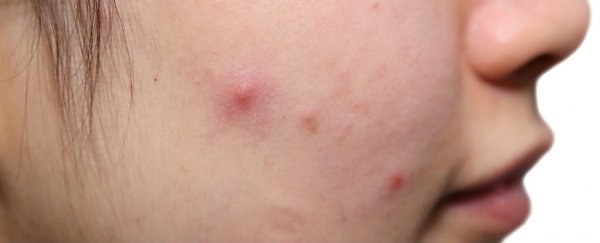We've all done it. A huge whitehead appears right at that time in your life when you really, really can't have a pimple, and you figure you'll just pop it, overload it with treatment cream, and pray to the skin gods that when you wake up in the morning, no trace of what you just did remains. You might get lucky, and when you wake up in the morning it'll look slightly less worse. More likely, though, you'll end up making things a whole lot worse for yourself.
So if it feels so logical (and so good), why is popping pimples so bad?
Before we can answer that, you need to understand how pimples actually form. As the Business Insider video explains, the whole process begins in the hair follicles under your skin, where oil-secreting glands, called sebaceous glands, live. You have more sebaceous glands on your face and scalp than anywhere else on your body, which explains why these places are the most pimple-prone.
The regular functioning of these sebaceous glands is to excrete healthy oils onto your skin and hair to keep them lubricated. But as our skin and hair cells naturally die off, or bacteria surround the area, they can block the pores this oil travels through, and the whole thing expands under your skin like a tiny, disgusting water balloon.
That tiny water balloon is going to hurt, make your skin look puffy, red, and infected, and if you pop it, some of those symptoms will be relieved. But not for long.
"Squeezing it can result in these contents being pushed into surrounding skin, making the problem worse," dermatologist Michelle Rodrigues from St Vincent's Hospital in Melbourne, Australia, writes for The Conversation. "It can also lead to infection, and a temporary darkening of the skin in that area.
Plus if all that poking and popping makes your already sensitive skin even more irritated, it could leave a permanent scar, right there on your face.
So what can you do? If you get pimples, the advice from experts is to just leave them and try to get on with life. Whiteheads will usually resolve themselves within a week, says Rodrigues, which sounds like an excruciatingly long time, but at least you're not making the possibility of new pimples any more likely.
While the best advice we've got right now to avoid getting pimples is eating right, and treating your skin with the right kinds of products, for young people, they're pretty much inevitable. So where's science when you need it? Why isn't there a cure or preventative treatment for the most common skin disease in the world?
Watch the episode of AsapSCIENCE below to find out how close we are to a miracle cure. Seriously, if any experts want to crowdfund it, I know a few hundreds of millions of people who'd get in on that.

